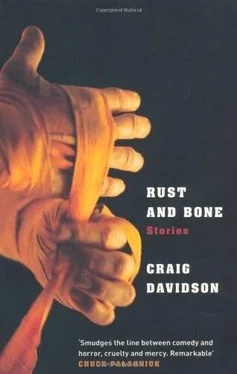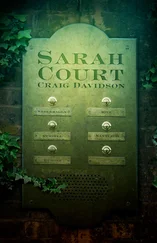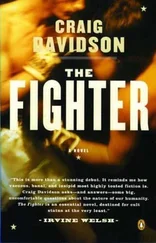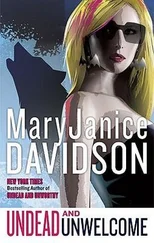“You’re lying.”
“Everybody please point at my brother.”
Twenty fingers did so.
“I see.” Herbert was more bemused than upset. “Well, isn’t that … odd.”
Herbert retreated down the hallway, pale body glowing in the thin nocturnal light. As he walked past the casement windows, burnt orange light of a harvest moon slanting through the glass, Jess noticed something odd: the moonlight did not touch upon the curvature of his arms and shoulders, did not touch his skin at all. It seemed to fall through him.
Fakery #77: The Possessed Apple . This ploy was first practiced in medieval days. An opportunistic rogue set an apple on the cobbles of the village square, claiming the ability to move it using only the precipitous powers of his mind. As he bore down with a look of fierce concentration, the apple would indeed begin to tumble over the stones. The ruse: the man cored an apple and placed a large beetle inside, then plugged both holes using potter’s glue and the remains of the core. The agitated insect tossed and turned within its mealy cell, causing the apple to move about. Humorous note: a few practitioners, touring this act through superstitious backwoods shanty-towns, were marked as warlocks and burnt at the stake.
[5]
IT WAS NEARLY eight o’clock when they left Sleighton. Dr. Iyer offered directions to the Regal Lodge—actually not a lodge at all, just five or six moss green cottages clustered on a rocky promontory jutting into Whitefish Bay. Their cottage had two cots and a stone fireplace. Stuffed largemouth bass hung on the walls, walleyed and glassy.
Jess sat on the porch beneath a tarpaper awning, looking out over the bay. The moon and stars stood on their exact reflections on the surface of the night-darkened water. A fish jumped in the center of the moon, the image rippling, glazing over, re-forming. She could barely make out the clapboard shacks standing amidst a cluster of pines across the channel.
Herbert joined her on the steps. They sat in silence for a while, listening to the constant lapping of waves against the dock pilings. The air was clean and raw and left the taste of winter at the back of their throats.
“What do you hope to accomplish by all this?”
“All what?”
“Don’t be dumb,” Jess said. “What do you want to ask? What do you want him to say?”
“I went back to the house, once. Before it sold and the furniture got carted away. Walking around, looking. This was at the time I still thought I’d, you know …”
“Banished Dad to an alternate dimension?”
“Right. He was everywhere in that house. He was in the bathroom cabinet, his razors and Burma Shave and that whatever it was, that pomade, to slick his hair. His clothes were lying around, smelling of him, that cologne. He was in the pictures on the walls and food in the fridge, the packet of flower seeds on the table. Hair stuck to a cake of soap. Everywhere.”
A bullet-shaped wedge of darkness cut through the moon’s reflection, the roar of an outboard motor swelling, dissipating.
“I made him a booklet, once. Cardboard and colored paper, tied together with yarn. I wrote down some of the tricks he’d taught me. Just this thing I’d made. It was childish; it was nothing. But I remember him saying he’d keep it close.” Herbert gazed into the sky, the seam where moonlight and darkness swam together. “It was still in his nightstand. There were a few old photos, some yellow slivers of toenail, the booklet. Why didn’t he take it with him, if it meant so much?”
They sat in silence. Jess stared out over the bay, starlight bending upon the water’s surface. A cold wind came across the water, slightly tainted by the sulfurous smell of the pulp mills. Three or four mallards congregated beneath the boathouse, bobbing bodies illuminated by an outdoor bulb; it took a moment before Jess recognized they were decoys.
“Why did you come?” Herbert asked. “You don’t want to see him.”
“That’s right.”
“So, just get out of town for a few days? Away from … all that?”
“I guess so.”
“It wasn’t your fault.”
“Herbert, let’s not, huh?”
“You should talk about it to somebody. You talked to Ted, I’m sure.” He paused, focusing on the billowy white shapes left by his words. “Listen, when I told you about the casket—it helped. I didn’t think it would.”
She hadn’t talked about it—not to Ted, Sam, or the department psychologist. It was a wound too painful to dress, the edges raw and bleeding, and she kept thinking if she treated the pain as something untouchable and beyond her control it might heal itself eventually. But that hadn’t happened, and now everywhere, in the trees and the water and the sky, she felt a sadness weighing down on her. And though sometimes the pain receded, washed out on a tide of new possibilities and potential, it always returned, the more unbearable for that brief absence.
“Do you want to hear about it?”
Was it even a question?
“Only if you want.”
She told him this:
The call was a routine 412: Suspicious or overt behavior in a neighboring domicile . Usually a domestic dispute: shouting, accusations, broken crockery. Jess hated 412s, the women with swollen eyes refusing to press charges, the same depressing minuet played out week after week. The call came from Grapeview Estates, a wealthy development near Port Dalhousie. She pulled into a driveway on Sarah Court shortly after nine o’clock, the night of February 27.
The caller was a man in his mid-fifties cradling a white terrier in his arms. He pointed to a half-constructed house across the street. Saw people moving around before dark. Arsonists. Lit a fire. Liable to burn the damn block down .
The house hovered at the lot’s back edge in a pool of darkness. Snow-covered roof beams poked at the sky like broken ribs, icicles descending from every unfinished angle. Jess walked beneath the funnel of light cast by a gooseneck streetlamp as new snow fell, flakes alighting on her hair and face. Arson was a summer crime, best when the air was hot and tinder dry; this was likely vagrants seeking shelter.
The flashlight cast a bleached glow on the untreated wood. Electrical cables snaked through holes in the ceiling and wound around exposed beams. The floor was dusted in fresh snow, untracked by footprints.
Officer Heinz, she called. Police .
She shone a flashlight down the basement stairwell: smashed cinderblocks, flattened fast food cartons, gray cement glittering with frost. The ashy, electric scent of a doused fire. Jess’s footsteps echoed hollowly as she descended. The radio crackled at her hip, a medley of codes and numbers. She told herself it was a vagrant, some washed-out husk posing no threat. But she’d heard stories of encounters beneath train trestles or shadowy freeway overpasses, men with little hope or sanity lashing out viciously. Her right hand tightened on the butt of a .38 service revolver.
A shape ran past the flashlight’s beam. Lit by the stark white cone, the eyes were glassy and feral, the hand clutching something small and silvery.
Jess raised her pistol, the motion almost casual. Her understanding that it was a child came a split second too late to stop her muscles flexing under a presumption of danger.
Muzzle-flash lit the boy’s face. He twisted away, as though ashamed. The force of impact threw his body back, feet leaving the ground, flying, falling. He hit the ground and skidded.
The flashlight fell from her hands, lighting the left side of the boy’s body. He wore a puffy white parka, blue jeans, a Timex wristwatch. His right hand was mittened; the left clutched a silver Zippo. The gunshot had jolted one of his boots off. There was a hole in the heel of his sock. Jess saw all this. His face was white, green eyes dilated, left eyelid fluttering. His mouth was open and there was some blood there, thin and shiny. He drew short, hiccupping breaths. His cheeks were smooth and hairless and freckled, his hair parted to the left. There was a small hole in his parka, frosted black around its edges. The hole was placed somewhere between shoulder and heart. Tiny flecks of blood all over his clean white parka and in the swimming light they looked to move across his chest like aphids.
Читать дальше












